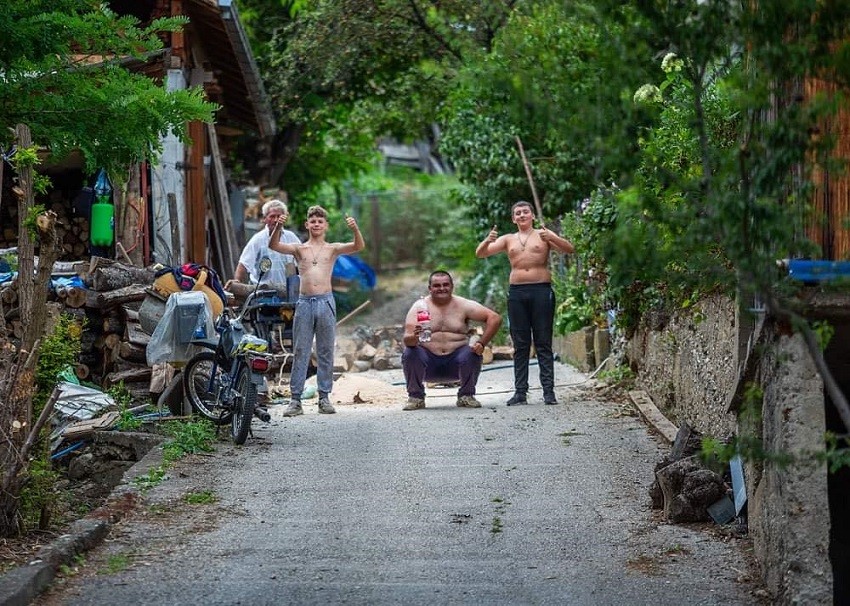 13
13
“People in Bosilegrad are polite, amiable, warm, especially when they found out we came from Bulgaria,” says photographer Vihren Georgiev. Together with three other photographers, he took part in a photography plein air, organized there with the help of the association GLAS, Bosilegrad. This being Vihren’s first time in the Western Outlands, he says he finds many similarities between the villages on the Bulgarian and on the Serbian side of the border.
“We went to a dozen villages and took photos, and what we, unfortunately, saw was that most of them were in a state of dilapidation, which is a sad thing because it is a reminder of the state small towns are villages in Bulgaria are in. We saw there was practically no life in the Bulgarian villages en route to the border, whereas Bosilegrad seemed more alive. There were very few people in the villages, and we saw lots of abandoned and dilapidated houses,” the photographer says and adds: “Many of them are used as summer homes, but interestingly, real estate is very cheap. You can buy a 3-storey house for EUR 15-18,000.”

Days before the plein air opened, the chairman of GLAS association organizing it Alexander Dimitrov was not allowed to enter Serbian territory because he was carrying Bulgarian books. The inexplicable reaction by the Serbian authorities was to be a main topic of discussion among the photographers. It also prompted Vihren to give expression to his support for him and for the things he has been doing for our compatriots in the Western Outlands through the years:
“I would like to say I was impressed by what Alexander Dimitrov is doing. Even though there are so few people left in the region, he has been trying to keep up a cultural programme, helping people not forget their origin. We talked a lot about the Easter Festival, part of which is the contest for the hardest egg. He has so many stories to tell,” says the photographer who only met Alexander Dimitrov this year, at the Rozhen Festival where Alexander had taken a group of children from Bosilegrad. 
Dimitrov told him about the problems Bulgarians in the region have been having for years - the depopulation of the area, their fears of openly stating their self-identity, the lack of jobs, and the pollution of the environment inflicted by the mines in the region:
“I don’t know whether the Serbian authorities are treating the people in the region badly, but the fact it has been abandoned economically speaks for itself,” the photographer says.
During his stay in Bosilegrad, Vihren witnessed a wedding which made a big impression on him:
“The interesting thing was that the tradition is for weddings to start at 6.30 in the morning, and there is singing and a brass band,” he says. “Which means everyone in Bosilegrad knows when there is a wedding going on. As is the tradition, and it is the same thing in some places in Bulgaria, the groom fetches the bride from her home. Interestingly, she then starts living with him and his family while they can decide not to invite her parents to the wedding.”

Translated and posted by Milena Daynova
Photos: Facebook/PeopleOfSofiq
From today, residents of Stara Zagora, young and old, can send their letter to Santa Claus. A letterbox has been set up in the foyer of the city's State Puppet Theatre to collect messages for Father Christmas. The cultural institution guarantees that..
A Christmas tree with Bulgarian decorations has been placed in a central location at the Griffin Museum of Science and Industry in Chicago. For the fifth consecutive year, Bulgarians living in Chicago crafted the lavish decoration of the Bulgarian..
The usurpation of cultural heritage is one of the many inevitable consequences of any military conflict, both historically and today. Until the end of the war in Ukraine, it is impossible to adequately analyse the extent of the damage caused to the..
In the week of St. Andrew’s Day (also known as Bears’ Day or Mechkinden), WWF is drawing attention to six orphaned bear cubs who have been given a..
According to the Annual Report on the Health Status of Bulgarian Citizens for 2023, t he main cause of death in Bulgaria is diseases of the..

+359 2 9336 661
